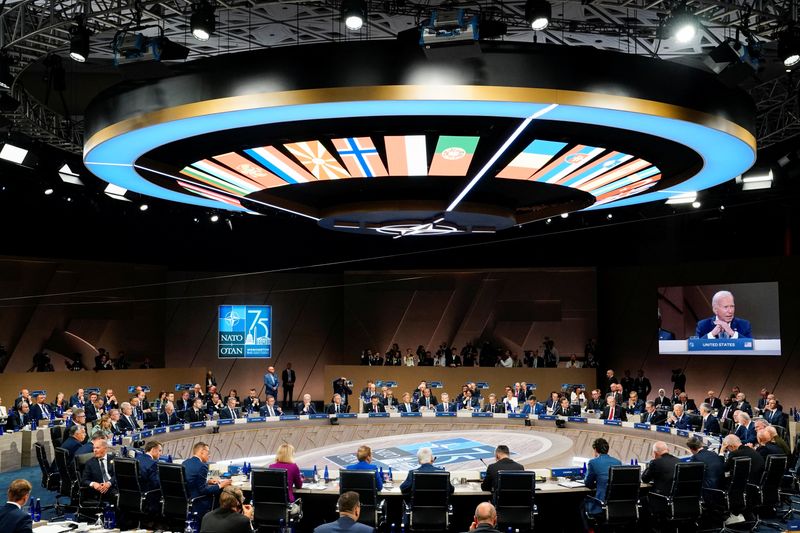
Allies act to oppose Russia and support Ukraine during the NATO meeting
The two nations declared at a NATO summit on Tuesday that the US will begin stationing longer-range missiles in Germany in 2026. This is a significant move meant to offset what the allies see to be an increasing Russian threat to Europe.
As a direct signal to Russian President Vladimir Putin, the move will arm Germany with the most powerful American weaponry stationed in Europe since the end of the Cold War.
The “episodic deployments” were preparatory to a longer-term stationing of assets in Europe, including the SM-6, Tomahawk, and next-generation hypersonic weapons with a longer range, according to a joint statement from the United States and Germany.
The Intermediate-Range Nuclear Forces Treaty, which the United States and the Soviet Union signed in 1987 and which fell apart in 2019, would have prohibited the relocation.
“We cannot rule out the potential for an assault on the sovereignty and territorial integrity of the Allies,” the coalition stated in a statement issued on Wednesday.
Additional assistance was on its way to Ukraine as the allies support President Volodymyr Zelenskiy.
NATO Secretary General Jens Stoltenberg had hoped for a multi-year commitment, but the communiqué stated that the allies intend to give Ukraine at least 40 billion euros ($43.28 billion) in military aid within the next year.
Said to be a “decisive enabler” of Russia’s war effort in Ukraine, Beijing continues to pose systemic threats to Euro-Atlantic security, the paper also reinforced previous NATO statements on China.
In a speech on Tuesday, Vice President Joe Biden declared that NATO was “stronger than it has ever been” and that Ukraine will be able to stop Russian President Vladimir Putin “with our full, collective support.”
He expressed his satisfaction on Wednesday that every NATO member was committing to growing their industrial bases and creating plans for domestic military production.
“We cannot allow the alliance to fall behind,” added Vice President Biden. “We can and will defend every inch of NATO territory and we’ll do it together.”
Surrounded by partner leaders he has spent his three years in office cultivating, Biden, 81, hopes the limelight from NATO will help him mount a type of comeback after he lost a June 27 debate and raised doubts about his suitability for government.
But Washington’s backing for Ukraine and NATO may undergo a dramatic shift, as the U.S. presidential election in November may indicate. Donald Trump, a 78-year-old Republican candidate, has questioned US backing for friends in general as well as the quantity of help sent to Ukraine to stave off Russia’s incursion.
Trump weighs in
Trump stated on Fox News Radio on Wednesday that the United States would remain in NATO but that he wanted nations to contribute more. All I want is for them to settle their debt. Europe is being safeguarded by us. They really badly take advantage of us,” he remarked.
Trump had already reversed direction after pressuring congressional Republicans to postpone providing military assistance to Ukraine.
NATO partners are uneasy due to ambiguity around US leadership.
“If there’s one thing that I worry about in the United States, it’s the political climate’s polarization—I have to admit, it’s very toxic,” Finland’s president, Alexander Stubb, told reporters. Finland is a member of NATO.
A number of senior European officials spoke with Trump’s top foreign policy advisor during the meeting, while Biden has been trying to mobilize supporters at home.
ADDITIONAL ASSISTANCE FOR UKRAINE
According to Stoltenberg, who was speaking to reporters, he anticipates that allies will settle on a “substantial” package for Kyiv that includes a new NATO command to help and train Ukraine in security matters.
He indicated that more announcements of prompt military help would be made, including measures to guarantee complete interoperability between Ukrainian and NATO forces and air defense.
Five more Patriot and other tactical air defense systems will be sent to Ukraine, according to announcements made by NATO members.
“On its irreversible path to full Euro-Atlantic integration, including NATO membership,” the alliance will continue to help Ukraine, according to the communique. One of the main points of controversy amongst the allies had been that wording.
It demanded that China stop providing political and material backing to Russia’s military campaign. Concerns were raised regarding China’s space capabilities, the country’s nuclear arsenal’s rapid expansion was mentioned, and Beijing was asked to start negotiations on strategic risk reduction.
One dollar is equivalent to 0.9243 euros.
All Categories
Recent Posts
Tags
+13162306000
zoneyetu@yahoo.com



